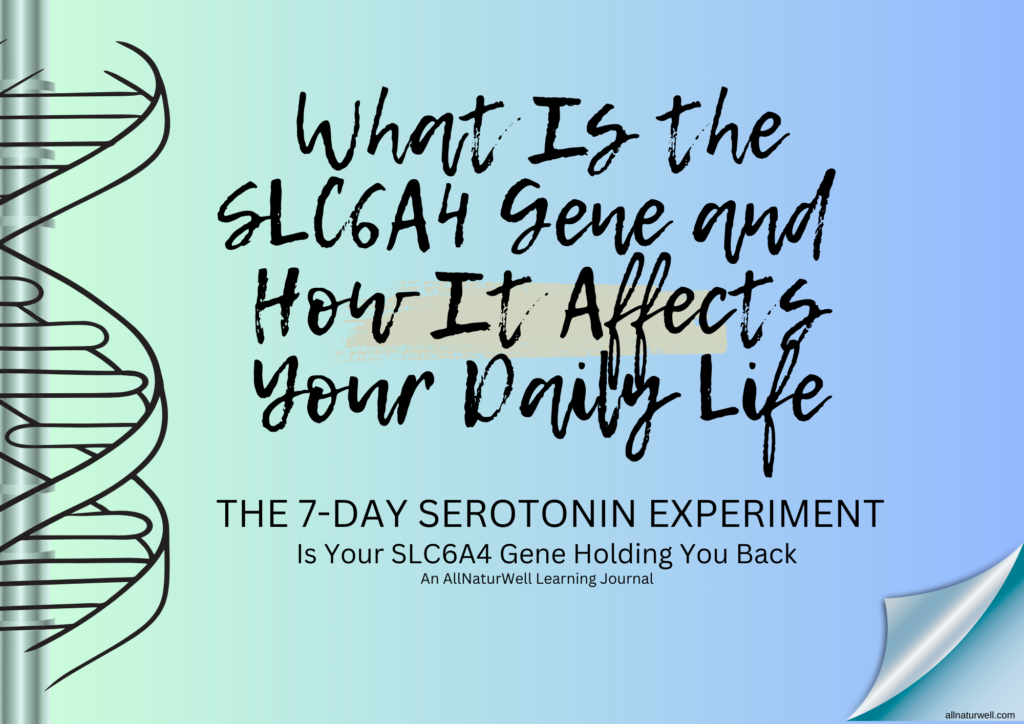What Is the SLC6A4 Gene
and What It Does in the Body
The SLC6A4 gene, also known as the serotonin transporter gene or 5-HTT, is vital for regulating serotonin levels. Serotonin is a neurotransmitter that influences mood, sleep and emotional balance. This gene encodes the protein responsible for transporting serotonin from the *synaptic cleft back into neurons, effectively recycling it for future use. Variations or mutations in the SLC6A4 gene can disrupt this process, potentially leading to mental health challenges such as depression or anxiety. (ChatGPT)
* The synaptic cleft—sometimes called the synaptic gap—is the tiny space between the end of one nerve cell (neuron) and the beginning of the next target cell. This gap is crucial for nerve cells to communicate with each other through the release and reception of chemical signals.
Understanding the Role of SLC6A4
Think of serotonin as a messenger traveling between brain cells to manage your mood and emotional responses. After delivering its message, serotonin is reabsorbed by neurons through the serotonin transporter, a protein encoded by the SLC6A4 gene. This reabsorption process, known as reuptake, is crucial for maintaining serotonin levels.
Mutations in the SLC6A4 gene can cause imbalances in this reuptake process. For instance:
- Increased Serotonin Levels: When the serotonin transporter is underactive, serotonin remains in the synaptic cleft longer. Consequently, this can lead to increased anxiety or irritability.
👉 So… underactive = stays longer = anxiety and/ or irritability
- Decreased Serotonin Levels: On the other hand, if the transporter is overactive, it reabsorbs serotonin too quickly. As a result, serotonin levels drop, which might contribute to depression or mood instability.
👉 where as … overactive = reabsorbs too quickly = depression and/or mood swings.
the SLC6A4 Gene
think of it like this...
To better understand how the SLC6A4 gene affects serotonin, think of your brain as an email system.
Neurotransmitters like serotonin are like important emails that need to be sent between nerve cells to regulate mood and emotional responses. After delivering their message, these “emails” need to be managed efficiently to keep the system running smoothly.
The serotonin transporter, encoded by the SLC6A4 gene, functions like an email management system that reabsorbs or “returns” old emails (serotonin) back to the sender (neurons) for future use. This reuptake process helps prevent the system from being overloaded with unnecessary messages, maintaining balance.
If the email system (transporter) is too active, it might return emails too quickly, causing important messages to be reabsorbed too soon. This can lead to feelings of sadness or depression. Conversely, if the email system is too slow, emails stay in the inbox longer than needed, which can result in feelings of anxiety or irritability.
This analogy helps illustrate how SLC6A4 mutations can disrupt serotonin regulation, impacting your mood and emotional stability. Understanding this process can guide you in finding targeted strategies to manage these imbalances and improve your mental well-being.
the SLC6A4 Gene
What Could an SLC6A4 Mutation Mean for You?
Now that you have an understanding of the SLC6A4, here’s what having an SLC6A4 mutation might mean to you.
Having a SLC6A4 mutation can lead to imbalances in serotonin, impacting your emotional stability. This might make you more susceptible to mental health issues such as depression, anxiety or mood swings. Specific alleles of the SLC6A4 are found to be significantly associated with ADHD. So, understanding this genetic link could very well empower you to take powerful and proactive steps.
Adopting Holistic Approaches
Incorporating holistic approaches can significantly improve your emotional well-being and help you manage the effects of SLC6A4 gene mutations. Start by integrating mindfulness and relaxation techniques into your daily routine. Practices such as meditation, yoga and deep breathing exercises can help regulate serotonin levels and promote a sense of calm. Additionally, engaging in regular physical activity can boost overall mood and support neurotransmitter balance.
Another key aspect is managing stress through lifestyle changes. Prioritize self-care by setting boundaries, practicing time management, and seeking support from a mental health professional when needed. Holistic approaches not only address the biochemical factors related to serotonin but also contribute to a healthier, more balanced lifestyle.
the SLC6A4 Gene
Nutrition and an SLC6A4 Mutation
What to Eat or Not
The best diet for supporting serotonin production and maintaining balanced serotonin levels typically includes foods rich in nutrients that contribute to serotonin synthesis and overall brain health. Here’s a brief overview of dietary recommendations:
👉 Foods to Support Serotonin Production
✔️ Tryptophan-Rich Foods:
- Turkey and Chicken: High in tryptophan, an amino acid that is a precursor to serotonin.
- Eggs: Also rich in tryptophan and other essential nutrients.
- Nuts and Seeds: Such as sunflower seeds, pumpkin seeds, and almonds.
- Dairy Products: Like cheese and yogurt.
✔️ Carbohydrates
- Whole Grains: Such as oats, quinoa, and brown rice. Carbohydrates help facilitate the entry of tryptophan into the brain.
- Fruits: Especially those with a low glycemic index like apples, pears and berries.
✔️ Omega-3 Fatty Acids
- Fatty Fish: Such as salmon, mackerel, and sardines. Omega-3s support overall brain function and mood regulation.
- Flaxseeds and Chia Seeds: Plant-based sources of omega-3s.
✔️ Healthy Fats
- Avocados: Provide healthy fats that support brain health.
- Olive Oil: Contains monounsaturated fats that can aid in mood stabilization.
✔️ B Vitamins
- Leafy Greens: Such as spinach and kale, which are high in folate (vitamin B9).
- Legumes: Like beans and lentils, which provide B vitamins essential for serotonin synthesis.
✔️ Fermented Foods
- Yogurt and Kefir: Contain probiotics that support gut health, which is linked to serotonin production.
- Sauerkraut and Kimchi: Fermented vegetables that enhance gut microbiota.
👉 Foods to Limit
✔️ High-Sugar Foods:
- Excessive sugar intake can lead to fluctuations in blood sugar levels, which may affect mood and serotonin balance.
✔️ Processed Foods
- This one needs no introduction – High levels of unhealthy fats and additives in processed foods can impact overall brain health and mood.
✔️ Caffeine and Alcohol
- Excessive consumption can interfere with serotonin levels and overall mental health.
👉 Additional Tips
- Hydration: Drink plenty of water to support overall bodily functions and mental clarity.
- Regular Meals: Maintain balanced, regular meals to ensure steady levels of essential nutrients.
Incorporating these dietary practices can help support serotonin production and contribute to better emotional and mental well-being. However, it’s also essential to consider a holistic approach, including regular exercise, adequate sleep and stress management.
Supplements To Consider
Certain supplements can support serotonin levels and overall mental health. Consider incorporating the following into your routine:
- 5-HTP (5-Hydroxytryptophan): This supplement helps increase serotonin production in the brain.
- Omega-3 Fatty Acids: Found in fish oil, these support brain function and mood regulation.
- Vitamin D: Essential for serotonin synthesis, especially during the winter months.
- B Vitamins: These are important for neurotransmitter function and overall mental health.
Before starting any supplement regimen, consult with a healthcare provider to ensure they are appropriate for your individual needs and circumstances.
Genetic Testing and Its Benefits
Genetic testing can also provide valuable insights into how your SLC6A4 gene functions and how it may impact your mental health. By identifying specific gene variations, you can tailor your wellness approach to address any imbalances in serotonin reuptake. This information can guide personalized treatment plans, including lifestyle adjustments, dietary changes and supplements, all according to your specific genetic blurprint.
Understanding your genetic profile allows for a more targeted approach to managing conditions such as depression and anxiety, leading to improved emotional well-being and overall quality of life. Explore genetic testing options to gain a deeper understanding of your unique needs and take proactive steps towards better mental health.
What Is Genetic Testing
Genetic testing is a medical process that analyzes your DNA to identify changes, anomalies or mutations in your genes, chromosomes and/or proteins that may influence your physical and mental health, predispositions to certain conditions and identify variations (mutations) in genes that can cause or increase the risk of genetic disorders.
Why Genetic Testing Matters
The information gained from genetic testing may be helpful in a number of ways for the neurodivergent, such as diagnosing genetic mutations, methylation disruptions and identifying personalized nutrient deficiencies that may be negatively influencing their mental health.
How Genetic Testing Works
Genetic testing works by analyzing a sample of your DNA, usually obtained through a saliva or blood sample. This sample is then examined in a laboratory to identify any genetic mutations, anomalies, or variations that could impact your health and wellness.
Begin your genetic testing research by click below to learn more about the genetic testing companies we affiliate with and support or speak with your health care provider on the topic. Either way, just begin and take control of your health and wellness journey today.
Your wellness is worth it.
Disclaimer: The information and/or products mentioned in these article are provided as information resources only and are not to be used or relied on to diagnose, treat, cure or prevent any disease. The statements made in this article have not been evaluated by the Food and Drug Administration. Any products mentioned are not intended to diagnose, treat, cure, or prevent any disease, but rather to be considered as an informational resource only to encourage critical thinking and personal research. The information in this article is intended for educational purposes only. The information is not intended to replace medical advice offered by licensed medical physicians. Please consult your doctor or health care practitioner for any and all medical advice.
You Might Be Interedted in
Unlock the secrets of your SLC6A4 gene with this 7-day guided serotonin experiment. Track your mood, sleep, gut health and stress levels to discover whether your serotonin system is affecting your daily life. An interactive learning journal designed to help you identify patterns and make informed wellness choices!
Sign up for our weekly newsletter. it's free!

52 Weeks, 52 Topics! Get Our Latest ‘Stay Well’ Newsletter Every Monday And Start Your Week Off AllNaturWell. A New Tip, A New Study Revealed, A New Product Reviewed. Get It Right To Your Inbox Weekly. No Need To Wait. It’s Free!







